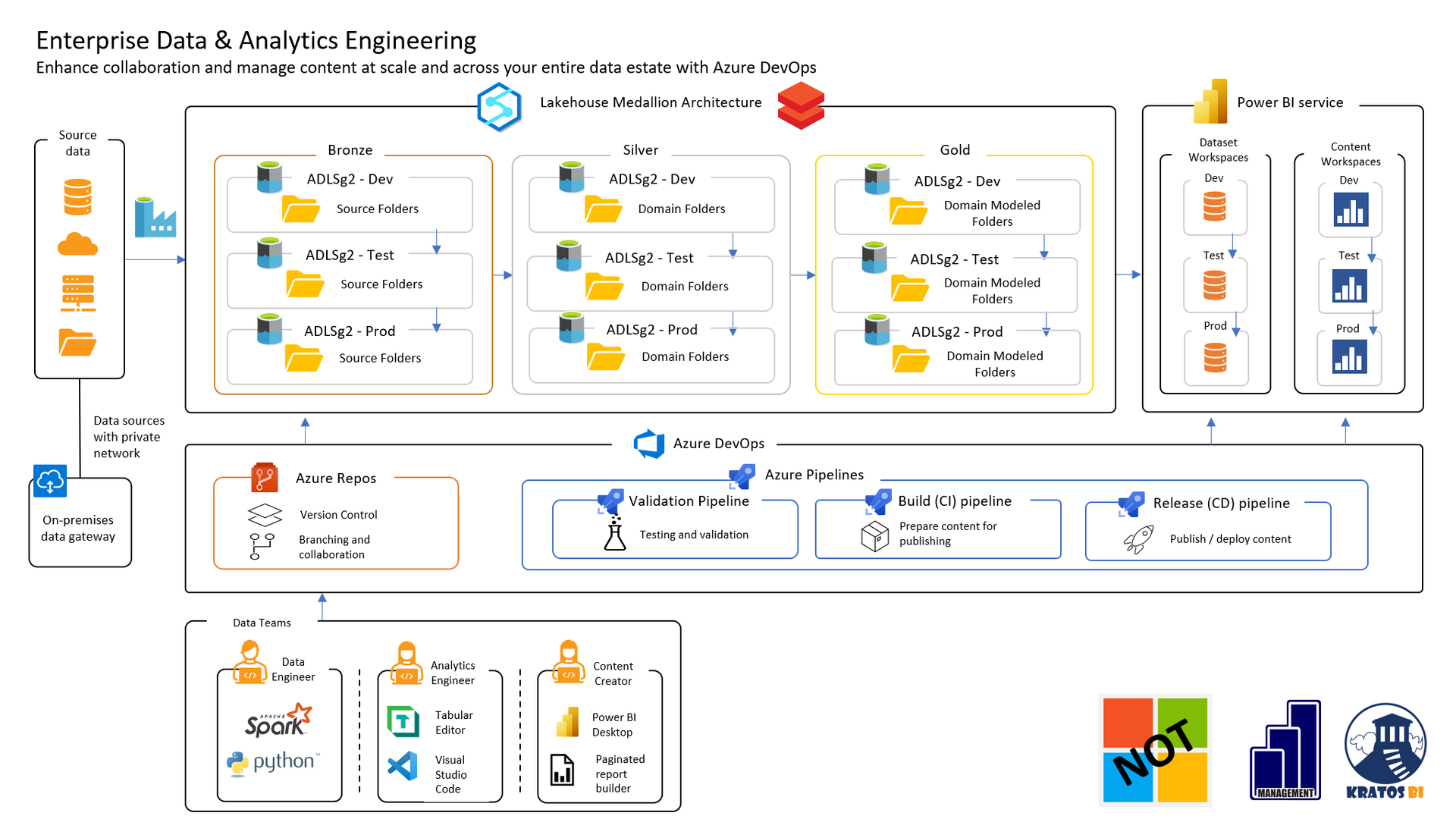Share
(Power) BI Developer Profiles
An interviewers guide for hiring (Power) BI Developers

Working in data takes all types of skillsets, abilities, goals and work styles. The same is true when it comes to Power BI Developers. Knowing the type of Power BI developer you are, or that you are looking to hire, can help you focus on the work that best suits your personality type. Understanding these profiles can really help people looking to successfully hire new resources.
SKILLS

When evaluating a Power BI developer, you need to understand these primary skill categories to understand where an individual fits into the different Power BI developer profiles.
- Sourcing - BI developers will access and use data from a variety of sources. SQL, Excel, CSV, JSON, XML, SharePoint lists, etc., are all potential data sources for BI. Understanding a candidate's experience with a variety of data types is essential.
- Interview Question: What are the three main parts of a SQL Query?
- Answer: Select / From / Where
- Transformation - Data must be reshaped to be useful for analytics. An engineer's experience in transforming data speaks to their ability to work with various formats and conform them to meet the analytics needs.
- Interview Question: What is the purpose of a surrogate key?
- Answer: A surrogate key is a platform-specific representation of a business key
- Modeling - Creating an Analytical (tabular) Model can be highly complex and encompass advanced modeling techniques that require a high degree of expertise with an eye to usability and best practices.
- Interview Question: What are the two types of tables in an Analytical Model, and what are they used for?
- Answer: Fact Table - used for measures. Dimension Table - used for storing attributes.
- DAX - DAX is the analytical formula language used in Power BI. DAX can be very basic and straightforward, and DAX can be nearly infinitely complex, spanning N number of dimensions.
- Interview Question: In DAX, how do you divide two numbers?
- Answer: Expression = DIVIDE(Numerator, Denominator, else value)
- Security - Zero trust Data Security is a foundational principle in all cloud data. Resources working in Business Intelligence need to understand the different layers of data security and various ways to implement them.
- Interview Question: What is Row Level Security (RLS) and Object Level Security (OLS)?
- Answer: RLS secures the row(s) of data to filter data for users. OLS prevents users from seeing data objects.
- Report Experience - There is a big difference between building out Paginated Reports or Business Object reports used to dump data out to users vs. interactive reports designed to help dive action by highlighting the most desirable action.
- Interview Question: Describe how you have built out interactive reports and the goals of these reports.
- Answer: Listen for solutions that will drive action.
- Size/Audience- Business Intelligence workers can build reports for 2-5 people or 50k. Report audience of team members, the C-suite, or the board of directors indicates the degree of attention, support, and conformity necessary.
- Interview Question: Describe your audience (size and role)
- Answer: Listen to solutions that align with your needs
PRO TIP - from Nigel Davison
"I always ask to see their work, or give them a dataset and some questions to answer. Before interview, you can screen out developers pretty quickly that way."
A career in Power BI is much like that of a graphic artist. Reviewing their portfolio of solutions can help you understand the level and quality of work that they produce.
PROFILES

These profiles are reasonably generic, where you may find that people fit into one or more of these different profiles. Use these as general rules of thumb to question yourself around strengths and weaknesses to see if these apply or are desired.
BUSINESS INTELLIGENCE GENERALIST
A BI Generalist knows a bit of everything. BI Generalists are great in a wide variety of places, knowing that they can skill-up in any given topic for a given purpose. You will find MANY consultants fall into the BI Generalist category. BI Generalists often build out solutions for 1-50+ people to consume.
PROS - BI Generalists are known for getting the job done and getting it done ASAP.
CONS - BI Generalists may not follow (or even know) best practices across any given skill, and thus pieces of a solution may require increased downstream support, maintenance, and upkeep.
BUSINESS INTELLIGENCE ANALYST
A BI Analyst will know a great deal about analyzing data and the business that they work with. The BI Analysts will be done rapidly to meet the needs of executives and leaders taking on new and changing challenges. You will find many data analysts have morphed into the BI Analyst category. BI Analysts often have a smaller, more targeted audience than a BI Generalist, but that audience can often be the C-level of an organization.
PROS - BI Analysts are great at understanding the business and building out excellent front-end solutions to meet people's needs.
CONS - BI Analysts may have low understanding or abilities around the Sourcing/ Transforming/ Modeling of data.
BUSINESS INTELLIGENCE ROOKIE
A BI Rookie has limited experience, if any when it comes to data and analytics. They are often fresh out of school, switching career paths, or have no idea what they are getting into. Understand that everyone starts as a BI Rookie. Depending upon what you are looking for, this may be ideal.
PROS - BI Rookies are readily available both on-shore and off-shore and can be found within schools and internship programs. BI Rookies get trained up to deliver per the needs of your organization.
CONS - BI Rookies will need a great deal of training and hand-holding. Make sure you have time and resources to do so.
BUSINESS INTELLIGENCE SPECIALIST
A BI Specialist will have a deep understanding of a tool (Power BI, Tableau, Spitfire, etc.) but may struggle to adapt and understand how to use the other tools.
PROS - Specialists are great if you have a primary tool in building out solutions quickly to address many needs in the tool they know.
CONS - Specialists can struggle when moving between tools. This struggle can cause problems for projects and delivery.
BUSINESS INTELLIGENCE ENTERPRISE ENGINEER
A BI Enterprise Engineer is similar to a BI Generalist. Still, where a BI Generalist may not follow best practices, a BI Enterprise Engineer broadly follows best practices across their solutions. A BI Enterprise Engineer is used to building and supporting solutions for hundreds or thousands of users.
PROS - BI Enterprise Engineers build good solutions to help drive your business forwards in data and analytics.
CONS - Good BI Enterprise Engineers are hard to find, can be very expensive, and can build solutions that require BI Enterprise Engineers to support.
DATA ENGINEER
A Data Engineer takes the Sourcing / Transformation/ Modeling of data to the next level. Data Engineers are masters in this space with a deep understanding of tools, processes, optimization, etc. Great Data Engineers will have deep knowledge and experience of the underlying data. Often the Data Engineer is brought in to complement the work of BI Generalist/ Analyst/ Enterprise Engineer, freeing them to focus on other aspects of Business Intelligence.
PROS - Data Engineers are a critical piece of any data and analytics platform.
CONS - Data Engineers are hard to find and expensive. They typically have little to do with front-end development.
CITIZEN DATA ENGINEER
A Citizen Data Engineer is primarily a sub-profile of BI Generalist/ Analyst/ Rookie tracks and is comprised of people who show an affinity to doing more around Sourcing / Transformation / Modeling and management of data. Citizen Data Engineers will often work with Power BI Dataflows and typical Power BI entities for general use.
PROS - Citizen Data Engineers can be an excellent source for Data Engineers and getting working code for Data Engineers. They think broadly and are more globally oriented.
CONS - Citizen Data Engineers often lack the skills and abilities of classically trained Data Engineers. This can lead to solutions that require more management and support.
ANALYTICS ENGINEER
An Analytics Engineer will delve deep into engineering the Analytic Modeling of data, DAX, row-level-security (RLS), refreshes, cache/direct query of data, and all things analytical modeling. An Analytics Engineer will work very closely with Data Engineers to build out and support the Enterprise Analytics Models. An Analytics Engineer is used to building and supporting solutions for hundreds or thousands of users.
PROS - Analytics Engineers are well versed in building large and highly performant analytical models.
CONS - Analytics Engineers are hard to find and expensive. They typically have a great deal to do with front-end development.
CITIZEN ANALYTICS ENGINEER
Like the Citizen Data Engineer, the Citizen Analytics Engineer is a subset of BI Generalist/ Analyst / Rookie tracks and is comprised of people who show an affinity to doing more around the modeling of data, DAX, RLS, and other Analytics Engineer capabilities. Citizen Analytics Engineers will often work with shared Power BI datasets used by several BI Generalists / Analysts / Rookies.
PROS - Citizen Analytics Engineers are an excellent source for Analytics Engineers. They think broadly and are more globally oriented.
CONS - Citizen Analytics Engineers often build models that need significant refactoring or have actual performance issues. This can lead to solutions that require more management and support.
POWER BI CITIZEN DATA SCIENTIST
A Power BI Citizen Data Scientist works with R, Python, and other tools to build out advanced analytical solutions to project what will happen in the future. Power BI Citizen Data Scientists will prefer to work with large wide tables.
PROS - Power BI Citizen Data Scientists will provide valuable insights into what is coming next and optimal paths forward.
CONS - Power BI Citizen Data Scientists are often clamoring to move on to full-time Data Science work and may be only around for a short time.
Did I miss any Power BI Developers profiles? Please let me know! Send an email to: PowerBIProfiles@kratosbi.com or reach out to me on either LinkedIn or Twitter.

CHRIS WAGNER, MBA MVP
Analytics Architect, Mentor, Leader, and Visionary




